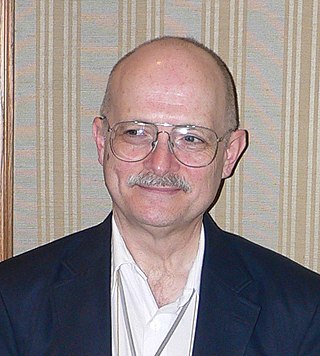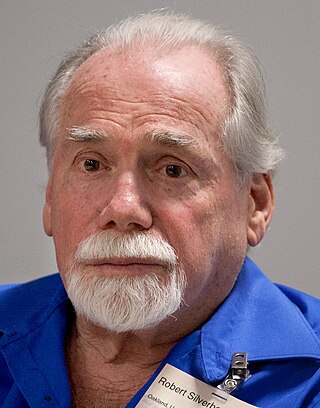
Horror is a genre of fiction that is intended to disturb, frighten or scare. Horror is often divided into the sub-genres of psychological horror and supernatural horror, which are in the realm of speculative fiction. Literary historian J. A. Cuddon, in 1984, defined the horror story as "a piece of fiction in prose of variable length... which shocks, or even frightens the reader, or perhaps induces a feeling of repulsion or loathing". Horror intends to create an eerie and frightening atmosphere for the reader. Often the central menace of a work of horror fiction can be interpreted as a metaphor for larger fears of a society.
Pulp magazines were inexpensive fiction magazines that were published from 1896 until around 1955. The term "pulp" derives from the cheap wood pulp paper on which the magazines were printed. In contrast, magazines printed on higher-quality paper were called "glossies" or "slicks". The typical pulp magazine had 128 pages; it was 7 inches (18 cm) wide by 10 inches (25 cm) high, and 0.5 inches (1.3 cm) thick, with ragged, untrimmed edges. Pulps were the successors to the penny dreadfuls, dime novels, and short-fiction magazines of the 19th century.
Science fiction films This is a list of science fiction films organized chronologically. These films have been released to a cinema audience by the commercial film industry and are widely distributed with reviews by reputable critics. This includes silent film–era releases, serial films, and feature-length films. All of the films include core elements of science fiction, but can cross into other genres such as drama, mystery, action, horror, fantasy, and comedy.

Vernor Steffen Vinge was an American science fiction author and professor. He taught mathematics and computer science at San Diego State University. He was the first wide-scale popularizer of the technological singularity concept and among the first authors to present a fictional "cyberspace". He won the Hugo Award for his novels A Fire Upon the Deep (1992), A Deepness in the Sky (1999), and Rainbows End (2006), and novellas Fast Times at Fairmont High (2001) and The Cookie Monster (2004).

Crime fiction, detective story, murder mystery, mystery novel, and police novel are terms used to describe narratives that centre on criminal acts and especially on the investigation, either by an amateur or a professional detective, of a crime, often a murder. It is usually distinguished from mainstream fiction and other genres such as historical fiction or science fiction, but the boundaries are indistinct. Crime fiction has several subgenres, including detective fiction, courtroom drama, hard-boiled fiction, and legal thrillers. Most crime drama focuses on crime investigation and does not feature the courtroom. Suspense and mystery are key elements that are nearly ubiquitous to the genre.

Science fiction is a film genre that uses speculative, fictional science-based depictions of phenomena that are not fully accepted by mainstream science, such as extraterrestrial lifeforms, spacecraft, robots, cyborgs, mutants, interstellar travel, time travel, or other technologies. Science fiction films have often been used to focus on political or social issues, and to explore philosophical issues like the human condition.

Robert Silverberg is an American author and editor, best known for writing science fiction. He is a multiple winner of both Hugo and Nebula Awards, a member of the Science Fiction and Fantasy Hall of Fame, and a Grand Master of SF. He has attended every Hugo Award ceremony since the inaugural event in 1953.

Fantasy literature is literature set in an imaginary universe, often but not always without any locations, events, or people from the real world. Magic, the supernatural and magical creatures are common in many of these imaginary worlds. Fantasy literature may be directed at both children and adults.

A historical drama is a dramatic work set in a past time period, usually used in the context of film and television, which presents historical events and characters with varying degrees of fictional elements such as creative dialogue or fictional scenes which aim to compress separate events or illustrate a broader factual narrative. The biographical film is a type of historical drama which generally focuses on a single individual or well-defined group. Historical dramas can include romances, adventure films, and swashbucklers.
Since the advent of the cyberpunk genre, a number of cyberpunk derivatives have become recognized in their own right as distinct subgenres in speculative fiction, especially in science fiction. Rather than necessarily sharing the digitally and mechanically focused setting of cyberpunk, these derivatives can display other futuristic, or even retrofuturistic, qualities that are drawn from or analogous to cyberpunk: a world built on one particular technology that is extrapolated to a highly sophisticated level, a gritty transreal urban style, or a particular approach to social themes.

A science fiction magazine is a publication that offers primarily science fiction, either in a hard-copy periodical format or on the Internet. Science fiction magazines traditionally featured speculative fiction in short story, novelette, novella or novel form, a format that continues into the present day. Many also contain editorials, book reviews or articles, and some also include stories in the fantasy and horror genres.
The Golden Age of Science Fiction, often identified in the United States as the years 1938–1946, was a period in which a number of foundational works of science fiction literature appeared. In the history of science fiction, the Golden Age follows the "pulp era" of the 1920s and 1930s, and precedes New Wave science fiction of the 1960s and 1970s. The 1950s are, in this scheme, a transitional period. Robert Silverberg, who came of age then, saw the 1950s as the true Golden Age.

Adventure fiction is a type of fiction that usually presents danger, or gives the reader a sense of excitement. Some adventure fiction also satisfies the literary definition of romance fiction.

Lloyd Arthur Eshbach was an American science fiction fan, publisher and writer, secular and religious publisher, and minister.

In literature, a serial is a printing or publishing format by which a single larger work, often a work of narrative fiction, is published in smaller, sequential instalments. The instalments are also known as numbers, parts, fascicules or fascicles, and may be released either as separate publications or within sequential issues of a periodical publication, such as a magazine or newspaper.
Romanian science fiction began in the 19th century and gained popularity in Romania during the second half of the 20th century. While a few Romanian science fiction writers were translated into English, none proved popular abroad.

Fantasy is a genre of speculative fiction involving magical elements, typically set in a fantasy world and usually inspired by mythology or folklore. The term "fantasy" can also be used to describe a "work of this genre", usually literary.

Dieselpunk is a retrofuturistic subgenre of science fiction similar to steampunk or cyberpunk that combines the aesthetics of the diesel-based technology of the interwar period through to the 1950s with retro-futuristic technology and postmodern sensibilities. Coined in 2001 by game designer Lewis Pollak to describe his tabletop role-playing game Children of the Sun, the term has since been applied to a variety of visual art, music, motion pictures, fiction, and engineering.

Brazilian science fiction has been a part of Brazilian literature since the mid 19th century. The first works of Brazilian Science Fiction emerged in the decades following Brazil's independence. Brazilian science fiction has its roots in authors such as Augusto Emílio Zaluar in the novel O Doutor Benignus and Machado de Assis in the short story O Imortal (1882). The genre grew in popularity over the 20th century, reaching its first “golden age” in the late 1950s, bolstered by the work of publisher Gumercindo Rocha Dorea. Following the end of the military dictatorship in 1985, the genre has witnessed a renaissance, with an influx of new writers and diverse influences reshaping the genre
Technology in science fiction is a crucial aspect of the genre.










